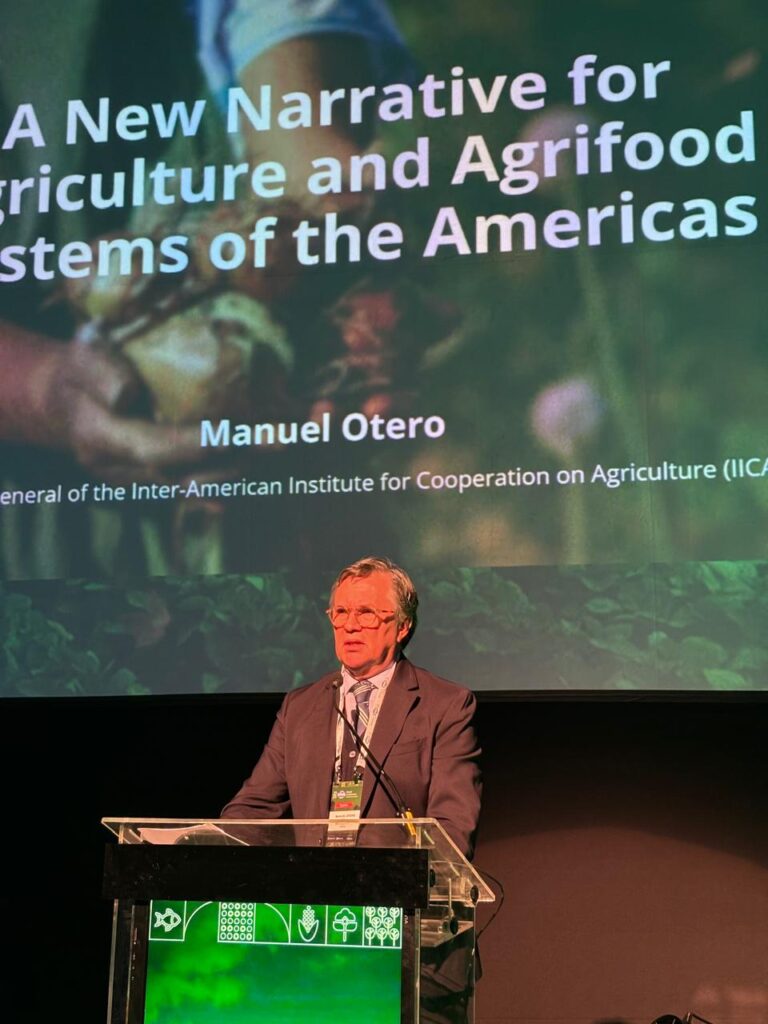
Manuel Otero, Director General of IICA, at the World Conference of the International Food and Agribusiness Management Association (IFAMA 2025).
Ribeirao Preto, Brazil 26 June 2025 (IICA) – The Director General of the Inter-American Institute for Cooperation on Agriculture (IICA), Manuel Otero, participated in Brazil in one of the largest global conferences in the agricultural sector, IFAMA, where he emphasized the need to build a new narrative highlighting the essential role of agriculture in the Americas as part of the solution to the challenges facing humanity.
Before an audience of about 600 participants from more than 50 countries, with a strong presence of organizations from the United States, Argentina, and the European Union, Otero stressed the need to show the true current face of agriculture, linked to science, technology, economic and social development, and conservation in the countries.
“Our time has come. We can offer a new image of the agricultural sector in the Americas, with new public policies in favor of producers, innovation, and nature. IICA, through strategic alliances, is committed to training a new generation of leaders for the transformation of agriculture,” he stated.
The World Conference of the International Food and Agribusiness Management Association (IFAMA 2025) took place in Brazil’s main agro-industrial center, Ribeirao Preto, a city in the state of Sao Paulo.
The Conference featured a unique network of global opinion leaders, convened to explore how to promote innovative agro-industrial models and ensure a sustainable food supply.
Attendees took part in four days of conferences and roundtables, exhibitions of cutting-edge agricultural technologies, and workshops focused on sustainable and innovative agro-industrial practices.
They also took advantage of their stay in Ribeirao Preto to visit some of Brazil’s most innovative agro-industrial facilities, a country that in recent decades has become an agri-food powerhouse, a transformative process strongly supported by research, science, technology, and innovation.
The event brought together agro-industry professionals—executives, managers, academics, producers, and researchers—in discussions about sector trends, challenges, new food production technologies, and sustainability proposals.
One of the main objectives was to further promote the development of sustainable technologies and practices in agriculture, in an environment conducive to the exchange of knowledge and experiences among agro-industry professionals.
Main Topics
The main topics of IFAMA 2025, carefully selected to reflect emerging trends and challenges faced by the industry, were: innovations in agriculture and sustainability, digital transformation and automation, talent development and diversity in agribusiness, renewable energy and bioenergy, global markets and food security, development of cooperatives and associations, and biotechnology and precision agriculture.
The conference included the participation of Silvia Massruhá, President of the Brazilian Agricultural Research Corporation (Embrapa), and prominent researchers from this public institution, which is a world reference in research, innovation, and technologies for agriculture.
Massruhá met this week in Brasilia with Otero, who announced the establishment of the “Home of Sustainable Agriculture of the Americas” pavilion at the upcoming COP30 in Brazil, within the space called “AgriZone,” coordinated by Embrapa.
During his presentation at IFAMA 2025, Otero drew attention to the need for a new narrative for agriculture and food systems in the Americas.
He highlighted that the continent contributes 23% of the world’s agricultural production, 29% of food exports, and is a leader in essential crops such as soy, sugar, coffee, corn, beef, and poultry, among others. In addition, it is home to 50% of the world’s known biodiversity.
In this regard, he emphasized Brazil’s extraordinary agricultural development, which went from being a net food importer in the 1970s to becoming the largest exporter of soy, beef, poultry, sugar, coffee, and orange juice, among other products. At the same time, it is one of the most biodiverse countries on the planet.
Otero referred to the need to leave behind the old narratives that certain sectors insist on presenting, which link agriculture with poverty and pollution. As a result of this type of storytelling, less than 5% of global climate finance is allocated to the activity, among other negative consequences.
“A new narrative for agriculture must be constructive, forward-looking, and focused on opportunities. The context of today’s agriculture shows us a sector strongly linked to science and technology, which is part of the solution to global challenges. Agriculture in the Americas must be recognized as a strategic platform to create economic, social, and environmental value,” he stated.
In his presentation, the IICA Director General stressed the need to show the sector’s successes without hiding unresolved challenges, which include the persistence of more than 50 million people who suffer hunger on the continent.
He highlighted, however, that 100 million people work in the agricultural and agro-industrial sector of the Americas, and that food systems represent up to 25% of the Gross Domestic Product (GDP) in some countries. He also spoke about the need to consistently communicate that the continent’s agriculture produces food while generating environmental benefits, since soil and forests act as carbon sinks and their ecosystems support water and oxygen cycles. He also emphasized the contribution of hemispheric agriculture to the energy transition, based on the strength of its biofuel production.
“The construction of a new narrative is an ongoing process, vital for the future of food systems, for which IICA has convened key actors. It must be implemented through a new generation of science-based public policies that empower producers as agents of change. It is also essential to collaborate with the public sector, private sector, academia, and other actors. Another key element is the training of a new generation of leaders strongly committed to innovation and sustainability, who connect local realities with global agendas,” he concluded.
More information:
Institutional Communication Division.
comunicacion.institucional@iica.int











